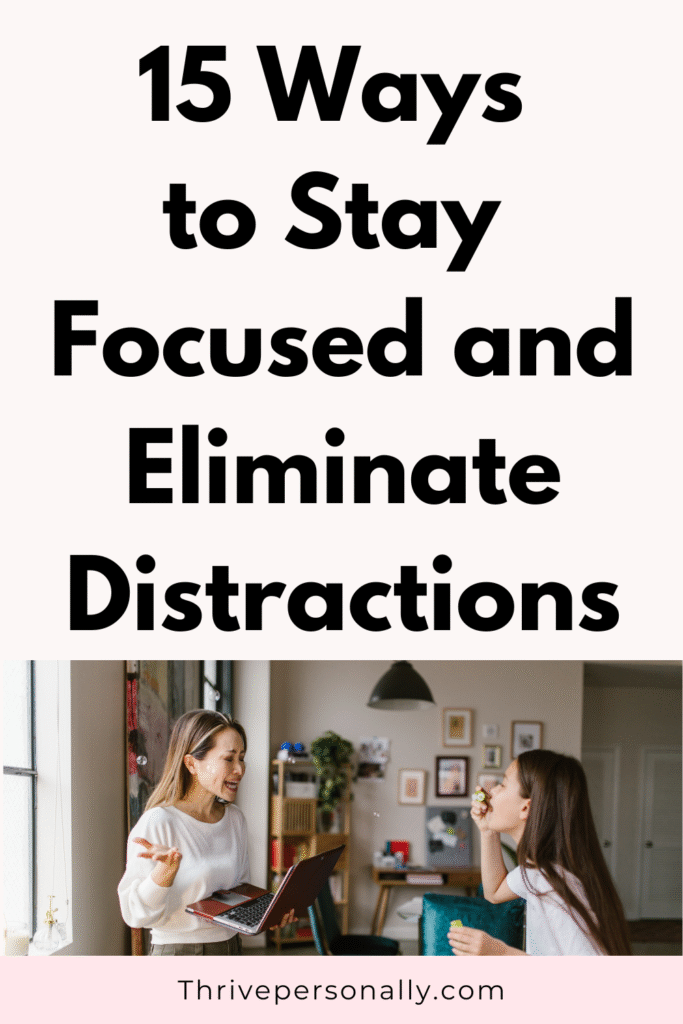Losing focus and failing to concentrate are just as frustrating as forgetting something important—or experiencing a mental nightmare. Maintaining focus is very important, but how can one find a solution to getting rid of distractions?
Today, more things are competing for your attention than ever before. Whether it’s the sound of your phone, the alerts on your computer, or the random thoughts that float into your mind, it’s easy to become distracted. You may sit down to work or study, and the next thing you know, an hour is gone scrolling through social media or just sitting idle.
You are not alone. Focus is a challenge most people face. But here’s the truth: staying focused is a skill you can learn. It’s not about perfection—it’s about mind training, organizing your space, and building habits that help you stay on track. You’ll gain control over your time, accomplish more, and end the day feeling proud.
Let’s explore 15 easy but powerful ways to stay focused and eliminate distractions.
1. Establish Day-To-Day Objectives
The number one reason you may get distracted is because you don’t know what you’re trying to do. Your mind is like a machine; unless it’s pointed at something, it will drift.
Write down your daily goals. Keep them clear and simple. Choose three to five important tasks—not ten vague ones.
The clearer your focus, the easier it becomes to say no to what doesn’t matter.
Read also: 8 Ways to Increase Focus While Studying
2. Segment Your Work into Smaller Tasks
Big projects feel overwhelming. That pressure makes you procrastinate or find a way to escape.
Break your work into smaller chunks. Instead of “write a report,” say: “outline report,” then “write introduction,” and so on.
Each small step gives you the energy to take the next one. That energy builds momentum.
3. Use Timed Work Blocks
Try the Pomodoro Technique. Set a timer for 25 minutes to work on one task. When the timer rings, take a 5-minute break. After four cycles, take a longer break of 15–30 minutes.
This method helps train your mind to focus in short bursts and gives your brain scheduled rest.
Read also: How to Develop a Clear and Focused Mindset (7 Ways)
4. Remove Distractions Around You
Look around. Is your phone nearby? Is the TV on? These distractions pull your mind away from the task.
Keep your workspace clean and quiet. Put your phone on silent or move it out of sight. Turn off anything that tempts you.
Your environment shapes your focus more than you think.
5. Communicate Your Need for Focus
Let people around you know when you need to concentrate. You can say, “I need an hour of quiet to finish something important.”
When others know your plan, they’re more likely to respect your time—giving you the space to focus deeply.
Read also: How to Focus on Your Needs and Embrace a Materialistic Mindset
6. Use Website Blockers
Mindlessly opening social media or YouTube is a common distraction. These sites offer quick comfort, and your brain craves that.
Use tools like Freedom, Cold Turkey, or StayFocusd to block these sites during your work hours.
This helps you regain control over unhealthy digital habits.
7. Work When You’re Most Productive
Everyone has a peak productivity time. For some, it’s morning. For others, it’s late afternoon.
Do your most important work during these high-energy hours. Use your own rhythm instead of fighting it.
Save emails and chores for low-energy times.
8. Get Enough Sleep
Rest powers focus. When you’re tired, concentration drops, your mind gets foggy, and you make more mistakes.
Aim for 7 to 8 hours of sleep each night. It sharpens your thinking and improves your focus.
Research from Nature Reviews Neuroscience confirms that sleep boosts memory, attention, and problem-solving.
9. Eat Foods That Fuel Focus
Some foods make you feel sharp. Others make you feel sleepy or sluggish.
Avoid sugary and processed foods. Instead, eat unprocessed meals: fruits, vegetables, protein, and healthy fats.
Drink water, too. Even slight dehydration can affect concentration.
10. Train Your Brain With Meditation
Throughout the day, your attention jumps around. Meditation trains your mind to return to the present moment.
Start with 5 minutes a day. Sit comfortably, close your eyes, and focus on your breath. When your mind wanders (it will), gently bring it back.
Studies from Harvard University show that mindfulness meditation improves attention and reduces stress.
11. Keep a Distraction Journal
Sometimes your mind distracts you with random thoughts or reminders. Keep a notebook nearby.
When a thought comes up, jot it down. Then return to what you were doing. You’ll handle the note later.
This prevents your thoughts from hijacking your focus.
12. Avoid Multitasking
Many people think they’re good at multitasking, but science disagrees. The brain can only focus on one thing at a time.
Jumping between tasks burns energy and reduces efficiency. Focus on one task. Finish it. Then move to the next.
It’s about quality, not quantity.
13. Reward Yourself After Focused Work
Focus is hard. Make it rewarding.
After completing a task, treat yourself—go for a walk, have a snack, listen to music. These small rewards help your brain associate focus with pleasure.
Eventually, focus becomes easier because your brain expects a positive outcome.
14. Build a Daily Routine
Routines help your brain know what to expect. When you wake up, work, and sleep at the same times, focus becomes easier.
You won’t waste energy deciding what to do next. Routines reduce decision fatigue and increase efficiency.
Start small. Build a basic morning routine. Then add a work routine. Keep it simple and consistent.
15. Reflect on What Distracts You Most
Every week, take a few minutes to reflect. What distracted you the most? Was it your phone? Background noise? Boredom?
Self-awareness is your first tool. Once you know your triggers, you can manage them and create a space that supports deep focus.
Final Thoughts
Staying focused in a world full of distractions isn’t easy—but it’s possible. You don’t have to be perfect. You just need to be aware.
You can retrain your brain by taking small steps like setting clear goals, using timed blocks, and learning to stay present.
You don’t need more hours in the day. You just need to use the ones you have more wisely.
Focus is a skill. Like any skill, it improves with practice. Start with one or two tips from this list today. Be kind to yourself. Progress will follow.
Save the pin for later



